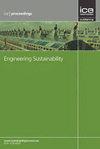偏远地区城镇供水偏好排序:台湾案例研究
IF 2.5
4区 工程技术
Q3 ENGINEERING, CIVIL
Proceedings of the Institution of Civil Engineers-Engineering Sustainability
Pub Date : 2024-04-18
DOI:10.1680/jensu.23.00033
引用次数: 0
摘要
本研究旨在利用层次分析法(AHP)为自来水设施扩建开发一个偏好排序模型(PRM)。文献综述确定了影响自来水管道扩建优先次序和决策的六个方面和十五个因素。由八名官员参与的试点研究得出的一致性指数(CI)为 0.070,低于 0.1 的临界值,证明了 AHP 问卷的可行性。正式的 AHP 问卷调查针对的是 30 名有六年以上工作经验的官员,其结果是 CI 为 0.062,CR 为 0.050,均符合小于 0.1 的标准。所确定的优先排序侧重于(1) 各个方面--水源、施工期、人口、住宅类型、政治因素、可施工性;(2) 各个方面中的因素优先排序。根据 26 个经验案例对结果进行评估,以确定中央政府是否可能批准。除了前三个案例的建设成本较高外,验收率比以前提高了约 60%。这些发现有望在实际应用中提高运营效率,节省时间和人力。本文章由计算机程序翻译,如有差异,请以英文原文为准。
Establishing preference ranking for town water supply in remote areas: case study in Taiwan
This study aims to develop a Preference Ranking Model (PRM) using the Analytic Hierarchy Process (AHP) for expanding tap water utilities. The literature review identifies six aspects and fifteen factors influencing the prioritization and decisions regarding the extension of tap water pipelines. A pilot study involving eight officials yielded a Consistency Index (CI) of 0.070, which is below the threshold of 0.1, supporting the feasibility of the AHP questionnaire. The formal AHP questionnaire, targeting 30 officials with over six years of work experience, resulted in a CI of 0.062 and a CR of 0.050, both meeting the criteria of being less than 0.1. The established priority ranking places emphasis on: (1) Aspects - water source > construction period > population > residential type > political matter > constructability; and (2) factor preference rankings within each aspect. The outcome undergoes evaluation based on 26 empirical cases to determine its potential approval by the central government. Apart from the costly construction in the top three cases, the acceptance rate sees an approximately 60% increase compared to previous rates. These findings promise to enhance operational efficiency, saving both time and manpower in practical applications.
求助全文
通过发布文献求助,成功后即可免费获取论文全文。
去求助
来源期刊

Proceedings of the Institution of Civil Engineers-Engineering Sustainability
ENGINEERING, CIVIL-ENGINEERING, CIVIL
CiteScore
3.70
自引率
16.70%
发文量
44
审稿时长
>12 weeks
期刊介绍:
Engineering Sustainability provides a forum for sharing the latest thinking from research and practice, and increasingly is presenting the ''how to'' of engineering a resilient future. The journal features refereed papers and shorter articles relating to the pursuit and implementation of sustainability principles through engineering planning, design and application. The tensions between and integration of social, economic and environmental considerations within such schemes are of particular relevance. Methodologies for assessing sustainability, policy issues, education and corporate responsibility will also be included. The aims will be met primarily by providing papers and briefing notes (including case histories and best practice guidance) of use to decision-makers, practitioners, researchers and students.
 求助内容:
求助内容: 应助结果提醒方式:
应助结果提醒方式:


